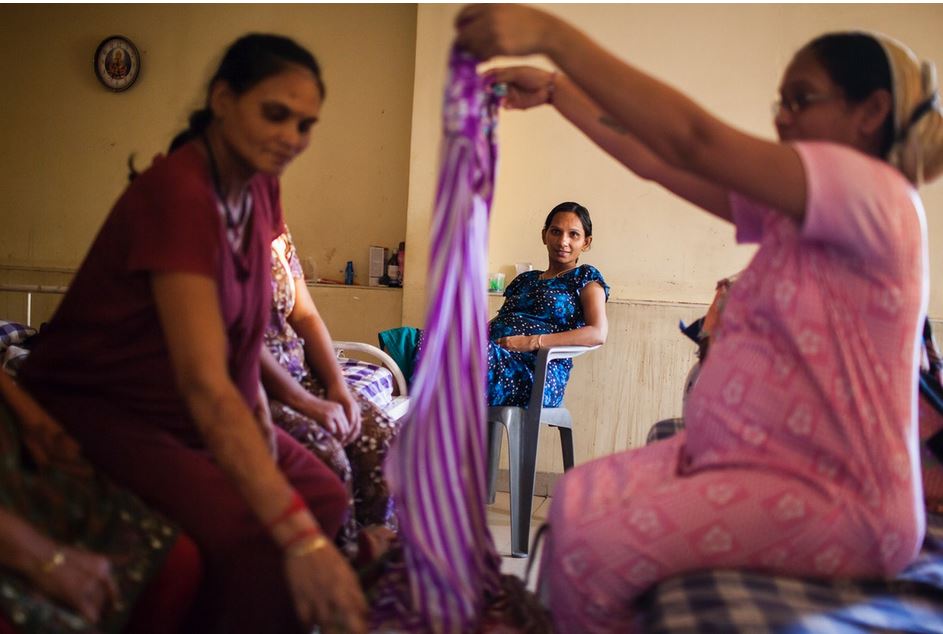Surrogacy is defined as a method of assisted reproduction that allows individuals to have children who otherwise may be unable to. The intended parent or parents work with a gestational surrogate; a woman who carries the child to term. It has also evolved to become an ‘alternative’ for women who can birth their own children. With the Surrogacy (Regulation) Bill introduced in 2016, discussions about the legality of surrogacy, especially commercial surrogacy, have become more prevalent. However, it seems accounts from those directly involved and affected by the practice are lacking.
The two types of surrogacy hotly contested in India are altruistic and commercial surrogacy. Altruistic surrogacy entails the surrogate being a close relation to the intended parents. The altruism comes from the surrogate not receiving any monetary compensation. Many contend that altruistic surrogacy is the only ethical option because it does not put a price on human body parts and life.
In contrast, commercial surrogacy includes predetermined monetary compensation, in addition to the coverage of ensuing medical and care costs. Critics of this method argue that it treats children as commodities and uses women’s wombs for profit. This argument perhaps carries weight, as countries like Canada and Australia only allow altruistic surrogacy.
Often lost in the midst of all this back and forth are the stories of both surrogates and intending parents. Those involved in the contentious debate of legality are often not directly involved in the surrogacy process.
Individuals’ stories vary. Some are proponents based on their experience. Many surrogates themselves say surrogacy has been a positive part of their life. There are the stories of the intending parents whose ‘dreams come true’. On the other hand, surrogates can be exploited and treated unfairly, or their lives are put at risk. Intending parents who desert children, or whose desire to cheaply buy a child outweighs clearly unethical practices.
Often lost in the midst of all this back and forth are the stories of both surrogates and intending parents.
Many surrogates are poor women who take up the assignment for money. It is generally believed that the transaction is purely commercial, but some surrogates develop emotional bonds with the babies.
Jothi Lakshmi, 30, explains it may have been for the best that she didn’t lay eyes on the baby, because otherwise she would have felt very guilty for giving it up. She discourages her family from talking about it because she knows it belongs to someone else.
“I have made peace with myself,” she says.

Surrogate women living in Akanksha Clinic in Gujarat (from MAPTIA)
Dr. Nayana Patel at Akanksha Clinic in Gujarat explains how the main attraction for foreigners to surrogacy in India was the price (surrogacy for foreigners has since been banned). In North America and Europe, where most clients were from, it can cost at minimum $90,000 USD. At Akanksha clinic, a third of that.
As second-time surrogate from Nepal, Diksha Gurunga, puts it, “You have to lose something to gain something and what we gain is a lot more than what we lose.”
“Between 2010 and 2014, I spoke to 33 surrogate mothers and egg donors living on the outskirts of Mumbai. It was clear that, within their limited options, they made a choice to do these jobs. It was also obvious that they had little power in those deals and that they had the most to lose…For these men, Kalpita had carried twin boys. She was paid 2.75 lakh rupees (£2,840), in 2009. It wasn’t nearly enough money, she said, for such dangerous work, “delivering two babies, putting our life in risk”.
Also read: How Does Bollywood Depict Surrogacy And How Is It Harmful?
Elly Teman, a medical anthropologist in Israel, found that being thanked was crucial for surrogates. When they were not thanked, they grieved. Almost always, clients and surrogates never meet. “…Even as her clients stood smiling by her side. “They did not ask us how much we had been given, or what happened,” said Kalpita. “They never asked.”
Some couples believe that too much communication with a surrogate could be dangerous—a common idea. They fear that they could be vulnerable to the demands of surrogates. Daisy Deomampo, a medical anthropologist whose work has included surrogates in Mumbai, argues that “this image of the “deceitful surrogate” has helped doctor and parents conceal the power imbalance that made foreign surrogacy possible”.
“Are we looking at a dystopic future where an underclass of women exists only to bear the children of the privileged classes?”
Many surrogates are happy with their situation. They can give a needing couple a child, and they can earn a living that they may never realize in another job.However, surveys done in Delhi and Mumbai show that surrogates can often be duped and not given the money they are promised. These women, who are usually poorly educated, are often not even give a copy of their contracts.
Individuals who for medical reasons choose surrogacy are not the only people turning to it. There are women who seek the process simply to bypass the ‘ordeal of pregnancy’. Most of them are women in high-powered careers, but housemakers too are engaging in the practice. One Dr. Gupta recounts a case in which one rich client had a child through surrogacy because she felt pregnancy would leave her looking old and with ugly stretch marks. The practice is akin to employing a wet nurse to breastfeed your baby — something that upper-class white women in the West used to do.
This striking image is almost a real-life version of the Handmaid’s tale. “Are we looking at a dystopic future where an underclass of women exists only to bear the children of the privileged classes?”
A horrifying side of surrogacy involves the sale of “extra” babies. Gianna Toboni from VICE met with a surrogacy brokers for dinner. The broker, holding an infant, tells Toboni that she can take the baby home that very night — for a price. These extra babies are a result of doctors transferring more than one embryo to a surrogate in the name of efficiency. The commissioning parents are often not told if she gets pregnant with multiple babies. The couples get the one baby they paid for, and the “extras” are peddled on the black market.
Still, it is argued that with proper regulation, surrogacy can successfully and ethically give both parents and surrogates what they want, eliminating such horror stories as above.
Nevertheless, in response to this, many question how we can regulate, and therefor legally sanction, a transaction “where children are brought into being by contract and where they’re naturally subject to becoming commodities?”
with proper regulation, surrogacy can successfully & ethically give both parents & surrogates what they want, eliminating horror stories.
Despite all this, many of the surrogates do not question that what they did was best, both for them and the intended couple. Thapa, 31, says she is doubtless that allowing her commissioning Australian couple to use her womb to fulfil their dream of parenthood was the right thing to do. She states “I wanted to be a surrogate mother because I wanted to deposit money into an account for my children for their future. I also wanted to help parents who cannot have children. I am proud to have given birth to a beautiful baby”.
“I feel like part of the family”.
With the 2016 Bill’s status still pending, it is contrasting stories like these which make surrogacy an immensely contentious issue. Likely, there will never be a clear answer. Nor a right or wrong one.
What is salient to many, but not realized by some, is that we must be wary of the fact that surrogacy does in fact involve human beings, who are undoubtedly more than mere commodities.
Also read: A Critical Analysis of The Surrogacy Regulation Bill, 2016
Featured Image Credit: MAPTIA
About the author(s)
Chandrika, based in Vancouver, Canada but wishing she could be in India, currently works with children and is a previous researcher in community-based participatory research at the Mayo Clinic. While not trying to figure out what's next in life, she can be found watching too much TV and hiding from the cold.





Surrogate motherhood has already become very popular. It’s already well-known procedure. People understand what it is. Anyway in such issue the main thing I guess is these women to be taking care properly. Usually they even have no education! I heard and read stories when Indian surrogates for example even don’t know how to read and write. They have big families. Women face with difficult situation. These are expensive education for children, absence of normal living conditions or even absence of house sometimes! And of course commercial surrogacy is a chance for such women. In general, during these nine months of pregnancy they can earn money and buy house. Of course due to the lack of education they cannot earn money in another way. Participating in the surrogacy program they need not to conduct difficult economic or mathematical operations. They just use their natural possibility and carry child for others. Unfortunately very often such women are used for own aims. I mean women receive not all money or are treated in bad conditions. In addition clinic or agents do not pay in the case of any complications.